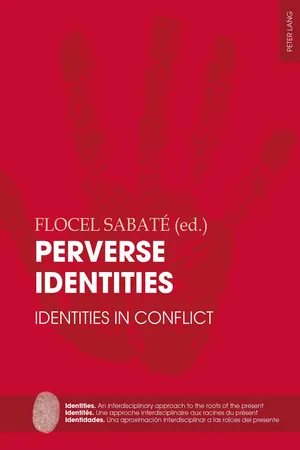About this book
The urgent need for the study of exclusive identities in conflict is ever more apparent in a globalizing world in which societies are becoming multicultural and complex and in which inter-cultural contact and the co-existence of languages and cultures comes increasingly to bear on the construction of plural identities. The present book considers perversion in the construction of identity and the perverse usage of identity in areas such as social cohesion – xenophobia, racism, ostracism, rejection, ageism, marginalisation – and the mismanagement of linguistic identity, language groups and associated discriminatory practise arising out of historical and culturally based discrimination. The texts were submitted in an international meeting held in the Institute for Identities and Societies of the University on Lleida (Catalonia, Spain) in November 2012.
Frequently asked questions
- Essential is ideal for learners and professionals who enjoy exploring a wide range of subjects. Access the Essential Library with 800,000+ trusted titles and best-sellers across business, personal growth, and the humanities. Includes unlimited reading time and Standard Read Aloud voice.
- Complete: Perfect for advanced learners and researchers needing full, unrestricted access. Unlock 1.4M+ books across hundreds of subjects, including academic and specialized titles. The Complete Plan also includes advanced features like Premium Read Aloud and Research Assistant.
Please note we cannot support devices running on iOS 13 and Android 7 or earlier. Learn more about using the app.
Information
Table of contents
- Cover
- Contents
- Perverse Identities. Identities in conflict (Flocel Sabaté)
- Differences between Male & Female Speech: a classical topic (María Teresa Quintillà)
- Identity in conflict in a Medieval border: the case of an offer/agreement by the count Ermengol VI of Urgell (Jesús Corsà)
- Identités en conflit. Disputes entre catholiques et « bons hommes » à la veille de la Croisade contre les Albigeois, 1206-1207 (Pilar Jiménez)
- Ethnic identity in medieval Sardinia: rethinking and reflecting on 14th and 15th century examples (Luciano Gallinari)
- The Battle of Sanluri in the process of recreating Sardinian identity (Esther Martí)
- Magia, hechicería y sexualidad en la narrativa caballeresca temprana: tres identidades perversas y domesticadas (Rafael M. Mérida)
- Tracing Miss Havisham in the Mirror, or Aging through the Other (Marta Miquel-Baldellou)
- « Hypocrite lecteur, mon semblable, mon frère ! » : le roman populaire du XIXe siècle et de la Belle Époque entre manichéisme et mauvaise foi (Jacques Migozzi)
- Vous dites Fantômas ? Dynamique sérielle et identités perverses (Matthieu Letourneux)
- Helpless and Invisible: Female Identity, Invalidism and the Cult of True Womanhood in Ellen Glasgow’s The Miller of Old Church (Emma Domínguez-Rué)
- Du mythe à l’idéologie politique : l’utilisation des légendes populaires par le Régime de Vichy (Régis Meyran)
- Agrarian Colonization and Francoist neo-traditionalism (Daniel Carmona, Raúl Travé)
- Perversion, Urbanity and Homosexuals. Multidimensionality in the Sex Life of the City (José Antonio Langarita)
- Cléopâtre de la Main parmi les ruines de l’identité du papier mâché : les identités perverses dans Hosanna de Michel Tremblay (Šárka Novotná)
- Aventura y perversión en El último goliardo (Estrella Díaz)
- Evil in Terry Pratchett’s Discworld: Havelock Vetinari (Luis Espinosa)
- Identités perverses et malfaisantes versus identités rebelles dans la poésie chilienne de la dictature et de la Transition (Benoît Santini)
- Les structures de la perversion (L’analyse de quelques romans de Thierry Jonquet) (Kálai Sándor)
- The use of immigration in the debate on identity in Catalonia during the course of resumption of democracy (Mariona Lladonosa)
- Hashtag Identity: Semiotics of The Spanish 15M Protest (Laura Menna)
- Front Pages of the Spanish and Catalan Press on the Demonstration of September 11th, 2012: Illustrating a National Identity or a Nationalist Farce? (Mariona Visa)
- Cultural nationalism: How are cultural practices involved in the nation-building process? (Pablo Giori)
- El morfema género en el pensamiento de la Real Academia Española: ¿Cuestión que va más allá de la teoría gramatical? (María Ángeles Calero)
- La royauté joola-ajamaat : constructions sémantiques et représentations autour du genre (Mónica Labonia)
- Immigration subsaharienne et altérité : une approche sociobiographique à la perception de la différence (Montse Solsona)
- Cultural Bricolage on Minors who Migrate on Their Own (Chabier Gimeno)
- Reconstruction of the identity in destination (Teresa Torres)
- Leadership and Complex Identities in Associations of African Immigrants (Fidel Molina, Dolors Mayoral, Paquita Sanvicén)
- Mi Nombre es Nadie. El Síndrome de Ulises. Emigrar en el Siglo XXI. Salud Mental y Migración (Joseba Achotegui)
